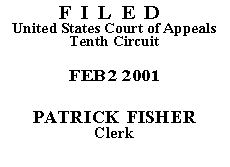

| SHARON DAY,
Plaintiff-Appellant, v. RICHARD SHOCKLEY, Sheriff of Larimer County; TIMOTHY PALMER, unknown agents on the Swat Team and Commissioners for Larimer County, Defendants-Appellees. |
|
In the early morning hours of August 26, 1993, plaintiff Sharon Day and two other individuals were forcibly evicted pursuant to a writ of restitution from a ranch property they were renting, after the property was legally transferred to a new owner through foreclosure. Plaintiff filed this pro se lawsuit under 42 U.S.C. § 1983, alleging a violation of her civil rights. The district court denied plaintiff's motions for leave to proceed in forma pauperis, for appointment of counsel, and for a transcript at government expense; granted summary judgment in favor of defendants on plaintiff's due process claim; entered judgment against plaintiff based on the jury's verdict on her remaining excessive force claim; and denied plaintiff's motion for a new trial. She appeals, representing herself. We have jurisdiction under 28 U.S.C. § 1291.
Plaintiff argues on appeal that: (1) the district court erred in denying her motion for new trial because the verdict was against the weight of the evidence; (2) defense counsel prejudiced her by referring to her as a liar in front to the jury; (3) she was denied a fair trial because two of the defendants gave perjured testimony; (4) she was at a disadvantage due to lack of funds; (5) the district court erred in denying her motion for appointment of counsel; and (6) the district court erred in granting summary judgment in favor of defendants on her due process claim.
We are unable to review plaintiff's first three issues on appeal because she did not provide a trial transcript. Under 28 U.S.C. § 753(f), a plaintiff in a civil proceeding may obtain a transcript at government expense if she is permitted to proceed in forma pauperis, moves for a transcript, and demonstrates a substantial question for appeal. Plaintiff filed the necessary motions, but did not convince the district court that she was entitled to proceed in forma pauperis or had a substantial question for appeal. Her argument that she was at a disadvantage due to lack of funds amounts to an assertion that the district court erred in denying her leave to proceed in forma pauperis.
We review the district court's decision to deny leave to proceed in forma pauperis for abuse of discretion. See Denton v. Hernandez, 504 U.S. 25, 33 (1992). We find no error. As a result, plaintiff was not entitled to a transcript at government expense under § 753(f). In the absence of a trial transcript, we must accept the district court's factual findings as correct. Trujillo v. Grand Junction Reg'l Ctr., 928 F.2d 973, 976 (10th Cir. 1991).
We review the district court's decision not to appoint counsel for abuse of discretion. Miller v. Glanz, 948 F.2d 1562, 1572 (10th Cir. 1991). We find no error.
Finally, we review the grant of summary judgment on plaintiff's due process claim de novo, using the same standard under Fed. R. Civ. P. 56(c) as applied by the district court. Ford v. West, 222 F.3d 767, 774 (10th Cir. 2000). Summary judgment is appropriate "if the pleadings, depositions, answers to interrogatories, and admissions on file, if any, show that there is no genuine issue as to any material fact and that the moving party is entitled to a judgment as a matter of law." Rule 56(c). As thoroughly explained by the district court in its January 11, 2000 order, plaintiff's property interest in the ranch property was extinguished when the foreclosure was adjudicated, and she therefore cannot maintain a due process claim based on insufficient service of the writ of restitution. We affirm this issue on the district court's reasoning.
AFFIRMED.
Entered for the Court
Circuit Judge
*. This order and judgment is not binding precedent, except under the doctrines of law of the case, res judicata, and collateral estoppel. The court generally disfavors the citation of orders and judgments; nevertheless, an order and judgment may be cited under the terms and conditions of 10th Cir. R. 36.3.